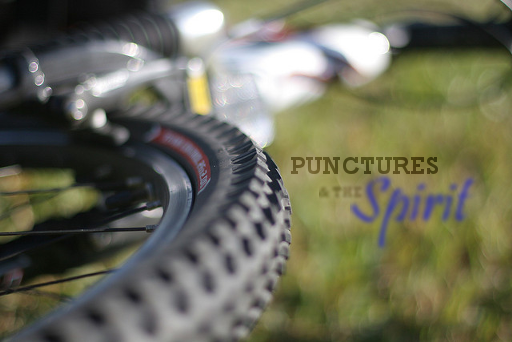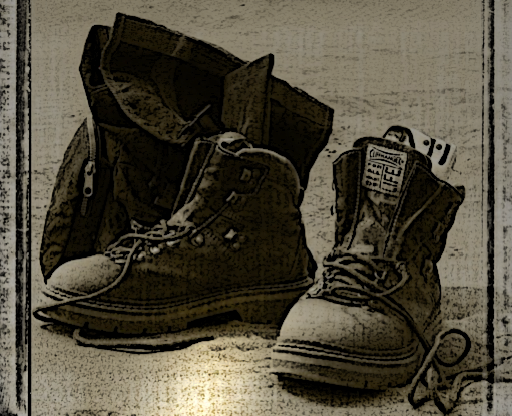Sometimes, we feel deflated; like the Spirit (1) has left us; and it feels a bit like riding a bike with a flat tyre. In more ways than one, the simile is helpful:
 Photo: SamuraiGhost, re-used under CC License
Photo: SamuraiGhost, re-used under CC License
1. You can avoid punctures easily, by very carefully checking where you ride. The thing is, if you do, you might as well be walking, you’d be quicker.
There is a famous apocryphal story of a person who would engage in contemplative prayer before any decision, including getting out of bed. That sort of behaviour is safe, but not quite commendable.
2. Even without a puncture, tyres go flat. They’re porous. Therefore, they need regular top-ups. Just the same with our spiritual life: being baptised, or giving your life to Jesus, or whatever you did at the start of your Christian journey is still there. But on its own, it gets weak. Get praying.
3. A puncture needs repairing. You can try to bike on a flat tyre. It will be exhausting, especially uphill; and you won’t go quite as fast. Don’t rely on your own steam to get stuff done; make sure that you are relying on the Spirit. If you don’t, you may still get it done – but it will be far less pleasant.
4. Repairing does not need to be immediate. Especially if you have it in the middle of oncoming traffic. In order to carry out the relevant repairs, you need to stop and take the time to do it properly… and you can’t always do that in the middle of our busy lives. Don’t get me wrong, the repairs must happen, but it’s alright to finish off urgent tasks before dealing with the repairs. Get out of the oncoming traffic. But don’t use that as an excuse to keep on putting off the repairs.
5. Repairing requires the appropriate tools. If you carry them with you, it will allow you to have a speedier answer (I remember how a tour guide in Amsterdam carried around spare inner tubes). Biblical knowledge, prayer discipline, routine – all these are tools that can support your spiritual life. Find the ones that work with your type of punctures, and keep them around with you, even when you don’t need them. If nothing else, they can be of service to someone else with a puncture.
6. Having a friend with the adequate know-how can help. Someone to talk to, someone to support you in prayer, is always beneficial.
7. You need to deflate the inner tube a fair bit before you can get the tyres off. If you just keep on going at full steam, you won’t manage to fix the punctures. All you’ll do is pump air back into your tyre, and that will last every time less.
8. Most punctures are invisible. That’s why you do the whole inner-tube-in-a-bucket-of-water thing. If no matter what the amount of prayer you do, no matter your willingness to get closer to God, you keep on drifting away, there might be something holding you back. Find the hole in the inner tube, and fix it.
9. If you don’t make sure the inside of the tyre no longer has any glass shards in it, your inner tube will perforate quickly, although not necessarily immediately. Some punctures come from our daily habits, others from our environment, others from part of our identity. If we manage to repair, through prayer for instance, our inner tube, but go back to the same routine, we’re going to get another puncture quickly.
10. Even when a tyre seems to be flat, there’s still some air in it. Just because we don’t feel it quite as strongly as before, or even not at all, it doesn’t mean the Spirit has left us altogether! On the contrary, the Spirit is always with us, even when we don’t feel it.
Do you have any to add?
—
(1) Fittingly, the Greek for Spirit is πνεῦμα, which also means breath!


